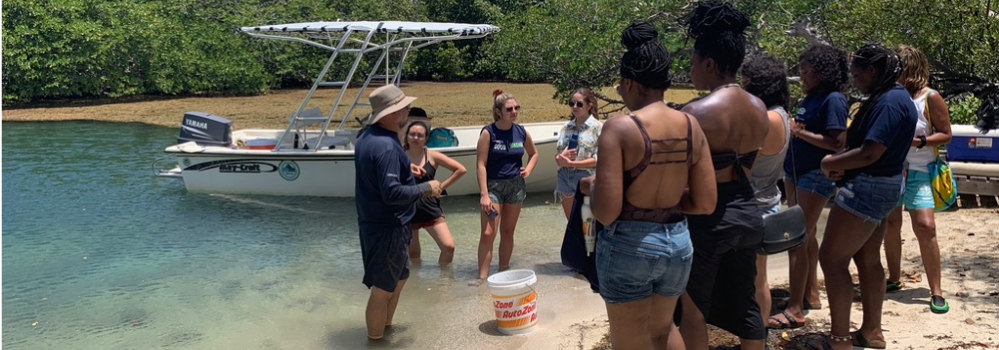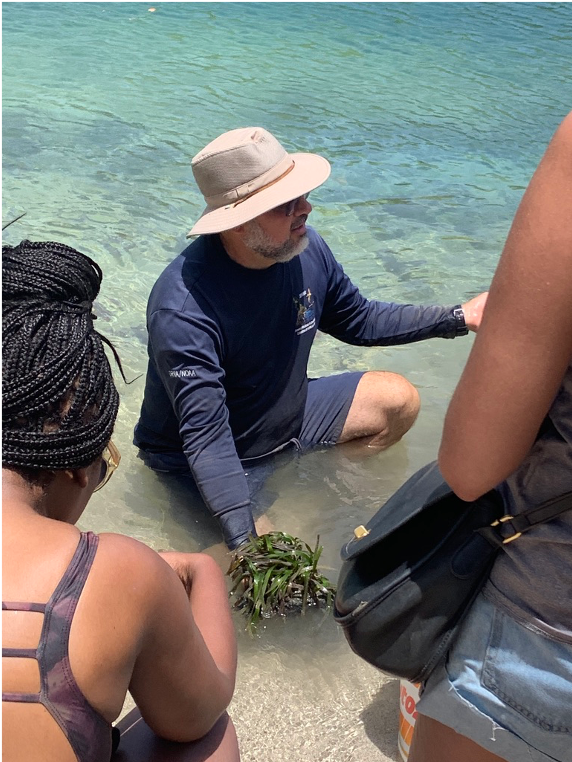
The Ocean Foundation brings climate resilience to the shores of Puerto Rico
 In response to the disruption Hurricane Maria caused to vital seagrass and mangrove ecosystems, The Ocean Foundation (TOF) has partnered with the Department of Natural and Environmental Resources (DNER) of Puerto Rico and the Jobos Bay National Estuarine Research Reserve (JBNERR), a federally protected estuary located in the municipalities of Salinas and Guayama, to begin restoration efforts. The 1,140-hectare reserve is an intertidal tropical ecosystem dominated by seagrass meadows, coral reefs, and mangrove forests. The reserve contains five distinct habitat types and provides sanctuary to endangered species including the brown pelican, peregrine falcon, hawksbill sea turtle, green sea turtle, several species of shark, and the West Indian manatee.
In response to the disruption Hurricane Maria caused to vital seagrass and mangrove ecosystems, The Ocean Foundation (TOF) has partnered with the Department of Natural and Environmental Resources (DNER) of Puerto Rico and the Jobos Bay National Estuarine Research Reserve (JBNERR), a federally protected estuary located in the municipalities of Salinas and Guayama, to begin restoration efforts. The 1,140-hectare reserve is an intertidal tropical ecosystem dominated by seagrass meadows, coral reefs, and mangrove forests. The reserve contains five distinct habitat types and provides sanctuary to endangered species including the brown pelican, peregrine falcon, hawksbill sea turtle, green sea turtle, several species of shark, and the West Indian manatee.

Since 2008, TOF has recognized that blue carbon restoration projects can help address climate change while promoting ocean health across the globe. TOF’s SeaGrass Grow program prioritizes carbon sequestration projects that involve seagrasses, mangroves, and salt marshes due to their carbon storage ability and benefit to local ecosystems and habitats. While all three are remarkably efficient at sequestering carbon dioxide, they also help provide coastal buffering; protecting against storm surges and flooding. Mangrove forests provide crucial habitat nurseries to fish and other species, which in turn helps the overall health of the ecosystem and the local economy, and salt marshes provide natural security to communities, helping to reduce flooding by slowing and absorbing rainwater. Seagrasses occupy just 0.1% of the global seafloor, yet they are responsible for 11% of the total organic carbon buried in the ocean, helping to mitigate the effects of ocean acidification. Additionally, a single acre of seagrass may support as many as 40,000 fish, and 50 million small invertebrates like crabs, oysters, and mussels. Seagrass meadows supply 50% of the world’s fisheries and provide vital nutrition for close to 3 billion people. In addition, all three ecosystems attenuate wave energy, reduce storm surge, and prevent coastal erosion.
Through our partnership with the Jobos Bay reserve, TOF is working to build local capacity and provide on the ground training to scientists, community members, and volunteers on seagrass and mangrove restoration methods. TOF believes it is just as important for local communities to understand the benefits these ecosystems bring, as it is to plant them in the first place. TOF’s work is supported by many individuals and corporate donors who calculate their footprint through TOF’s Carbon Offset Calculator, and our program offsets that footprint by applying charitable contributions to blue carbon restoration or conservation projects. To explore your own footprint, click here.
Ben Scheelk is a program officer for The Ocean Foundation.
The Ocean Foundation is a member of Restore America’s Estuaries’ Affiliate Member Program. Learn more and join this network today »
